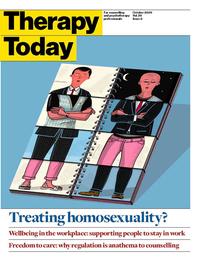STOP PRESS: Dedicated Website for Counselling for LGBT/QIA+ Couples.
An interesting article in Therapy Today (the magazine for counselling & psychotherapy professionals, published by the British Association for Counselling & Psychotherapy) – October 2009, Volume 20, Issue 8.
If you are troubled by your sexuality and you think that counselling might help you, make an appointment with Dean Richardson – a Specialist LGBT Therapist – to discuss counselling and what you might need from therapy.
The Gay Cure?
by
John Daniel
http://www.therapytoday.net/article/show/1168/
Excerpt:
The counselling and psychotherapy profession was subject to unflattering media scrutiny earlier this year [2009] following the publication of research which found that a significant minority of mental health professionals in Britain are attempting to help lesbian, gay and bisexual (LGB) clients become heterosexual.
Under the headline ‘British therapists still offer treatments to “cure” homosexuality’, the Guardian reported that a survey (of 1,328 counsellors, psychotherapists, psychoanalysts and psychiatrists throughout the country) found that 222 practitioners had attempted to change at least one patient/client’s sexual orientation, while 55 said they were still offering the therapy. The fact that some of those practitioners are members of BACP prompted the following response from Phillip Hodson, BACP Fellow and Media Consultant, in the letters page of the Guardian the next day: ‘[BACP] is dedicated to social diversity, equality and inclusivity of treatment without sexual discrimination or judgmentalism of any kind, and it would be absurd to attempt to alter such fundamental aspects of personal identity as sexual orientation by counselling.’
And yet this is what a significant minority of counsellors working in Britain today are still attempting to do. ‘I think it’s probably the tip of the iceberg,’ says Michael King, Professor of Primary Care Psychiatry at University College London Medical School, and one of the three scientists responsible for the aforementioned research published in the BMC Psychiatry journal. ‘It was only a small minority, about four per cent, who said that they would treat someone who came and asked for help, but another 10 per cent said they would refer on to someone who would, so it looked like about 14 per cent thought it was an appropriate thing to do.’
Click http://www.therapytoday.net/article/show/1168/ to read the article in full.

